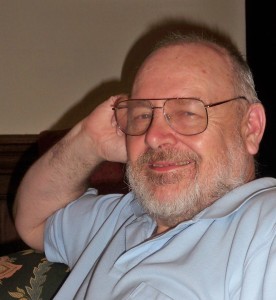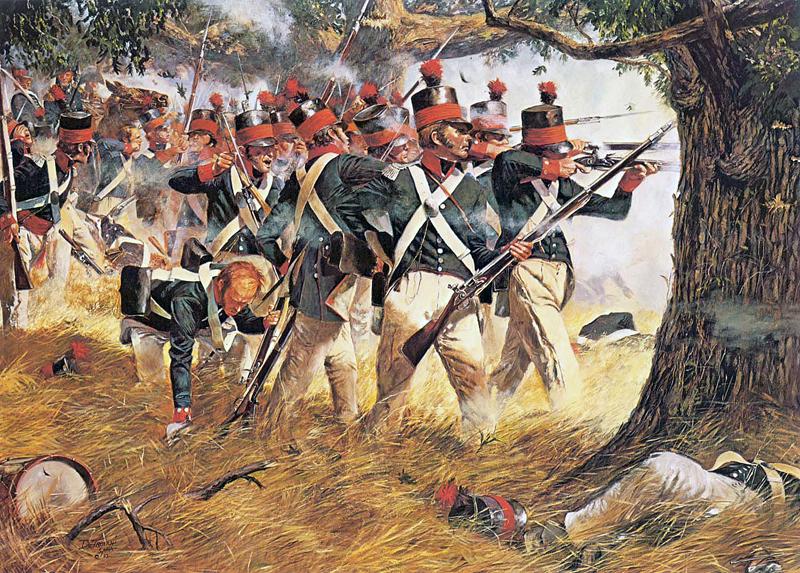War of 1812: British never had a chance to take Baltimore
(Courtesy of United States Army Center for Military History.)
Did the British really want the United States territories back and was that the reason for the War of 1812? That is a question scholars of the war have pondered from both sides of the Atlantic. One of them, Christopher George, who claims to be a child of both the United Kingdom and the U.S., says, no.
“The truth is that the British — by early 1815 — were exhausted after fighting the French for thirty years and lacked the resources or the will to get the former American colonies back,” he explained. George, who wrote the highly acclaimed Terror on the Chesapeake The War of 1812 on the Bay; White Mane Books (2000), said it is a difficult war to explain.

“The British had rescinded their ‘Orders of Council,’ which the Americans had protested,” George said. Essentially, the “orders” required a duty to be paid to the British before the Americans could trade with Central Europe. The news of the rescinded orders took so long to travel across the Atlantic, the Americans declared war and the British responded. To do otherwise was “not honorable,” added George. “The war wasn’t really even necessary.”
This month, George is a guest panelist at the University of London for a conference on “The War of 1812: Myth and Memory, History and Historiography.” George will share the podium with a scholar from Queen’s University at Belfast and the director of the United States Marine Corps History. Invited by the Institute for the Study of the Americas, part of the School of Advanced Studies at the University of London, George will discuss “New Information on the Battle for Havre de Grace, Maryland, May 3, 1813 and the British Sack of the Town.”
George also has been invited by the Deputy Historian for the U.S. Department of Defense to share his knowledge of the War of 1812’s first campaign. He is a guest in their Historical Speaker Series and will deliver the lecture on July 17th at the Pentagon.
Born in Liverpool, Christopher George moved to Baltimore in 1955 when he was 7 years old. His fascination with the War of 1812 began in grade school where he was “chided about the bombardment of Fort McHenry” by his classmates because he was British.
George, who speaks with a British accent, returned to Liverpool in 1960, attending the same grade school as three of the “fab four,” George, John and Paul; Dovedale Primary. He graduated from John Lennon’s high school, Quarry Bank. George matriculated at Loyola College in Baltimore and earned a bachelor’s degree in history. He also holds a master’s degree in liberal arts from the Johns Hopkins University.
At the time of its publication, George’s Terror on the Chesapeake was a different perspective on the War of 1812. “Because I could look at the war from both sides,” he said. His face glows when he discusses events that are two centuries old. His knowledge is so thorough, he sounds like he was there. “The attack on the British at Baltimore was very fool hardy,” he explained.
 Warren [Adm. Sir John Borlase Warren of the British Royal Navy] reported to London that he and Beckwith [Col. Sir Thomas Sidney Beckwith of the British Royal Army] discussed the possibility of attacking Annapolis and Baltimore but that they felt the odds were against them being able to successfully attack either place. He said, “upwards of Eleven Thousand Troops” had been assembled at Baltimore and “Five Thousand men were around Annapolis and others expected from Washington.” He told London that Beckwith agreed that attacks with the forces available “would prove very doubtful.” Terror on the Chesapeake
Warren [Adm. Sir John Borlase Warren of the British Royal Navy] reported to London that he and Beckwith [Col. Sir Thomas Sidney Beckwith of the British Royal Army] discussed the possibility of attacking Annapolis and Baltimore but that they felt the odds were against them being able to successfully attack either place. He said, “upwards of Eleven Thousand Troops” had been assembled at Baltimore and “Five Thousand men were around Annapolis and others expected from Washington.” He told London that Beckwith agreed that attacks with the forces available “would prove very doubtful.” Terror on the Chesapeake
George said that the capture and burning of Washington, D.C., took only two days because it was basically deserted.
The great irony is that because [President James] Madison did not arrange for the necessary forces to repel the British invasion of 1814, it was the enemy who pointed their muskets at the windows of Congress. The British shot them out after General Ross’s [Major General Robert Ross of the British Royal Army] horse was killed, along with several of the general’s men. Not only this, but the presidential mansion was “grossly insulted” by the enemy not to mention looted by rowdy Americans. Terror on the Chesapeake
George added that the British could never have captured Baltimore. It was too well protected.
Events were shaping up toward a decisive moment in history at Baltimore because the British had no conception of the powerful concentration of drilled militia and experienced naval forces that awaited them. Because their decision to attack Baltimore had been made on the spur of the moment, their intelligence of the military developments in the city was hazy at best.

As the [Royal British] squadron retreated down river, Major [George] Armistead [U.S. Army] ordered the small storm flag that had flown during the bombardment to be hauled down. His men hauled up the huge flag 42 feet by 30 feet that Mary Pickersgill had sewn. The fort’s band struck up with “Yankee Doodle.” Eight miles down river, on board the truce vessel Old Roads Bay, Francis Scott Key was intensely moved by the end of the bombardment and the sight of the huge flag waving above the battlements. On the back of an envelope, he jotted down the words of a poem. He called the poem, “The Defense of Fort McHenry,”… Terror on the Chesapeake
Just like the well documented inquiry into the modern day’s 9/11 disaster, there are hundreds of pages that documented several episodes of the War of 1812. “There were commissions — just like the 9/11 commission — for the capture of Washington and the riot of Baltimore, where the first blood of the War of 1812 was shed,” said George who found the thorough documentation was helpful in the writing of his book.
Terror on the Chesapeake is available at bookstores and at Amazon.com. At work on a new book about the War of 1812’s British General Robert Ross with John McCavitt of Belfast, Christopher George added, “It is the different individuals involved in the war on both sides that made the story so interesting to a writer. I am very interested in people’s motivations, and what makes people tick.”

Caryn Coyle writes about arts, culture and food for the websites CBS Baltimore and Welcome to Baltimore, Hon. Her fiction has been published in a dozen literary journals including Gargoyle, JMWW, The Little Patuxent Review, Loch Raven Review, Midway Journal, The Journal (Santa Fe) and the anthology City Sages: Baltimore from City Lit Press. She won the 2009 Maryland Writers Association Short Fiction Award, third prize in the first Delmarva Review Short Story Contest, 2011 and honorable mentions for her fiction from the Missouri Writer’s Guild (2011) and the St. Louis Writer’s Guild (2012).

